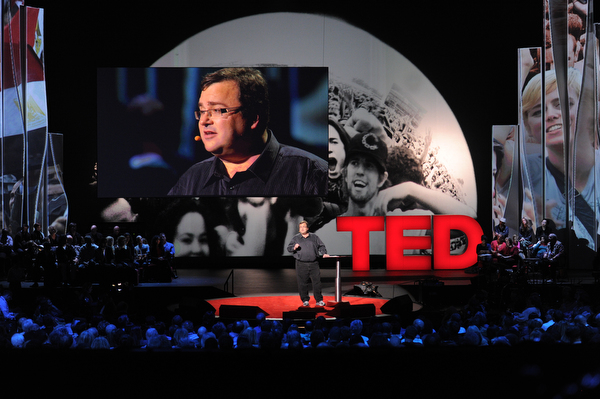Photo: James Duncan Davidson
Known as the “startup whisperer”, Reid Hoffman has invested in storied Internet companies including Flickr, Facebook and Zynga, companies that have helped deliver us from the “information” age to the “network” age. Interested in the social side of the Internet revolution, he is also the co-founder of LinkedIn, a company he started to provide a relevant technology platform for workers of the future.
Work in the network age simply doesn’t work the way it used to, he says. Whereas a career would once have progressed smoothly from role to role, up an evenly-flowing escalator, the fast-moving, interconnected world has “jammed the escalator of the previous generation’s careers,” says Hoffman. “We need a new map. The new map is a network.”
He started LinkedIn, he says, precisely to help provide the technological basis for workers of the future, based around one simple framework: we should all be the entrepreneur of own own lives. And if we think of this as surprising, that entrepreneurs are pioneers, or lone wolves, then we need to rethink our preconceptions. Because as it happens, entrepreneurs are building networks all the time and we all need to think more deeply about what it means to live in a networked world. “Network literacy is absolutely critical to how we’ll navigate the world,” says Hoffman, whose book The Startup of You was published recently. And there are four important attributes to understand in order to master the skill.
1. Network technology
Networks aren’t new. As Aristotle told us: “We are creatures of the city,” and we were social way before technology came on the scene. But technology certainly helps: compound math has helped LinkedIn grow so that Hoffman can now reach over 15 million distinct people. “That’s more people than live in either Greece or Portugal.”
2. Network identity
“In a networked age, identity is not so simply determined. Your identity is actually multivariate, distributed and partly out of your control. Who you know shapes who you are,” says Hoffman. With Zynga, Mark Pincus intended to create a gaming network: games that would become part of how people connect with each other. Those people playing Zynga games don’t think of themselves as gamers, but the games they play nonetheless become part of their identity.
3. Network intelligence
“Information is critical for all professionals, but what’s key is having access to the right information at the right time,” he says. Given that access is no longer the issue; now it’s about how to find the right information. Hoffman describes his process when an investment opportunity comes his way. He asks people in common with a potential candidate to rate them from 1-10, describing using his own extended network as a “radar pulse” to figure out with whom he should spend his time.
4. Network capabilities
“I don’t form a thesis and then go look for entrepreneurs who fit that thesis,” says Hoffman. “I position myself in a network and surround myself with people who bring me interesting people and companies.” In other words, we all need to reset our own personal centers to focus more on communities and networks, less on information itself. Network literacy is critical, and we must consciously work towards developing and honing the capability in our own lives and careers.
See also Reid’s talk on public intellectuals–and how the Internet might just change the world, filmed at TEDxSilicon Valley in 2009.

Comments (16)
Pingback: 12 best twitter accounts to follow for every startup
Pingback: 12 best twitter accounts to follow for every startup - blog.sabpaisa.in
Pingback: Peter Drucker: “Take Control Of Your Career” | Boom Ideanet
Pingback: Network Identity | A Place to Put My Thoughts
Pingback: Restore Trust at Work with These 3 Words | sajeevmenon1
Pingback: Restore Trust at Work with These 3 Words | Sebans
Pingback: Restore Trust at Work with These 3 Words - Reid Hoffman, Ben Casnocha, and Chris Yeh - Harvard Business Review
Pingback: Disruptive Thinkers: The Post that Started it All | DEF2013
Pingback: The Intersection Event 2013 | Sten Tamkivi's Seikatsu
Pingback: The Startup of You. Reid Hoffman’s conference at TED | savantplus
Pingback: "Omul retelelor" » Bogdana Butnar .ro
Pingback: Why Festiwal Przedsiębiorczości BOSS is important and how to get the most out of the BOSS week?
Pingback: TED2012 and Why conferences will never be the same « engineers don't blog
Pingback: An Entrepreneurial Lullaby: The Reid Hoffman Edition | Charlie Oliver